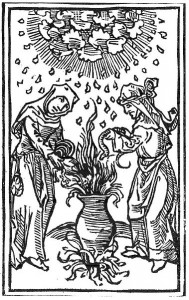 With a fling of spittle and a forbidden gesture of the hand, the victim receives a subtle and annoying minor curse. Effects vary and are not terribly debilitating, but the effect on the superstitious and those in the public eye can be devastating.
With a fling of spittle and a forbidden gesture of the hand, the victim receives a subtle and annoying minor curse. Effects vary and are not terribly debilitating, but the effect on the superstitious and those in the public eye can be devastating.
Everyone’s heard of “the gypsy curse” or the “evil eye.” Country folk have blamed “the curse” for all kinds of misfortunes: poor harvest, cows not milking, acne, bad luck, unrequited love, diseases, and more. While not seriously debilitating, a minor curse is annoying and frustrating for the subject and any companions. So what exactly happens when a character falls victim to the “evil eye” of a resentful adept or village wise woman? Pick from the table below, roll randomly, or devise your own!
Perhaps, offer a roleplaying bonus of 50 XP times the victim’s character level for a top performance during the game session. A lesser restoration spell will remove the minor curse…
Lesser Curse
School necromancy; Level cleric 2, sorcerer/wizard 3
Casting Time 1 standard action
Components V, S
Range touch
Target creature touched
Duration permanent (D)
Saving Throw Will negates; Spell Resistance yes
You curse the target with one of the following:
- -2 decrease to an ability score (minimum 1)
- -2 penalty on attack rolls, saves, ability checks, and skill checks
- -4 penalty on one particular category of saving throw, ability check, or skill check (e.g. -4 penalty to Will saves, -4 penalty to Strength checks, -4 penalty to Perception checks)
Effects vary depending on the manifestation of the lesser curse. You may also invent your own curse, but it should be no more powerful than the examples below.
The lesser curse cannot be dispelled, but it can be removed with a lesser restoration, break enchantment, limited wish, miracle, remove curse, or wish spell. It can be dispelled at will by the caster—usually after some restitution.
One of the following befalls the PC:
- Character convinced of being a different class
- Laughs uncontrollably at anything another person says
- Excessive flatulence (-2 charisma)
- Itching all over (-1 Dexterity)
- Very bad breath (-1 charisma to anyone within 10 ft.)
- Very bad body odor (-1 charisma to anyone within 10 ft.)
- Attracts insects
- Attracts animals (specific type: mice, birds, cats, skunks, etc.)
- Makes bad jokes incessantly
- Has no inner dialogue
- Says everything twice
- Says everything twice
- Whenever anyone makes a successful skill check, character brags, “I can do better than that…” (or the equivalent)
- Always eating/drinking
- Shouts whenever speaking
(Pathfinder Roleplaying Game Compatible)
______
Come back next Wednesday for more than 40 additional minor curses!

Fantastic! =)
Hey James, nice job! I can’t wait to see the other 40!
Providing game mechanics for Old World superstitions like the “evil eye” is exactly the kind of thing we’re talking about in the Tales of the Old Margreve project. Love to see you there if you’re interested.
Very nice job. Well thought out and it could easily be a great tool to help the story along.
The fifteen effects are quite clever and amusing.
I really like 11 and 12.
I really like 11 and 12.
I love it. Definitely something that really helps to flesh out some nice mechanics driven role play. Solid stuff, can’t wait to see the rest.
I love stuff like this that I can drop into my own campaign without a lot of revision. Simple, effective, and so entertaining!
This seems like it could be too powerful for a 2 or 3 level spell. How do you determine which of the 15 effects? Is it chosen by the DM, the spellcaster or randomly? And when you say if effects the PC do you mean the target of the spell (which I guess will most likely be an npc) or the spellcaster? Why is it a touch spell? Isn’t the whole point of the evil eye is that it can be given with just a look?
On a more positive note I’ve always wanted to play a gypsy fortune teller type who could give the evil eye so it is good that other people are thinking along the same lines.